Jim Leach played an important part in Michigan rock and roll before he left for California and became a top Hollywood radio reporter, known around the country as ‘James St. James: The Real Jimmy Hollywood’. Because of his contributions to Michigan’s rock and roll legacy, Leach was chosen as an Honorary Inductee to the MRRL Hall of Fame in 2014. He has recently put out a CD titled “Jimmy Hollywood’s Greatest Hits” that features 14 recordings from Michigan bands that he worked with in the 60’s and 70’s and includes several songs that were released as singles on his own Chivalry label. MRRL contacted Leach in California by phone to talk about the artists and songs included in the collection.
MRRL: What made you decide to put this collection together after so many years?
JL: I’ve been doing my radio show for nearly 32 years and during that time and many people have mentioned that they’d like to hear those songs again that were put out on the Chivalry label. At that time, in the late 60’s and early 70’s, I felt that Michigan and the corridor that ran from Saginaw to Flint to Detroit was the area for some of the hottest music in the world. 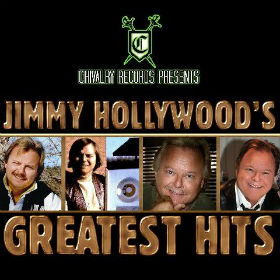
It’s fairly easy to hear the songs by ? and The Mysterians and the Cherry Slush, but some of the songs on the CD are very hard to find. I even had difficulty locating some of them since I had lost everything from my days in Michigan in a flood. All my stuff had been stored in the office of my friend Pete Hauffe but everything was ruined when the Tittabawassee River overflowed. I had to beat the bushes to find the best copies of the Chivalry material, and some like “Prayer”, the final song on the CD, was a recording of the song sent to me by one of my listeners, complete with some crackles and pops. Some people have told me that they like that since it gives it that authentic vinyl sound.
That being said, we had every song digitally remastered by Mack Woodward, the son of former Cherry Slush guitarist Charlie Woodward. Mack is a Grammy-nominated engineer and he is responsible for the songs sounding so fresh on the CD even though most are between 45 and 50 years old.
I also want people to know that this was not done for money. The profits will go to the Boy’s and Girl’s Clubs of North America.
MRRL: “96 Tears” is, by far, the most famous song on your album. What do you remember about your experiences promoting a song that became # 1 hit in 1966?
JL: I remember getting the gold records on October 26th at Saginaw High School. The big thing for me was that they were presented by Neil Bogart who went on to become one of the biggest names in the music business with his Casablanca Records label. It was also the first gold record that Bogart, who was then working for Cameo-Parkway, was involved with. In later years, he had all those gold records with Donna Summer and the Village People during those disco times, but “96 Tears” was special to him and he always said: “You never forget your first.” 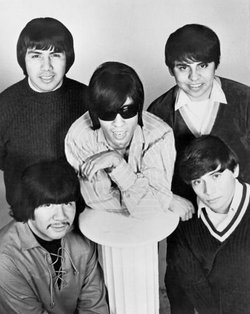 ? and The Mysterians
? and The Mysterians
Rudy (Question Mark) and I went to Saginaw High together. Of course he doesn’t use Rudy now, but that’s where we met and hit it off because we both liked music. He always said: “Someday I’m going to be in a band and have a big hit and I want you to be there.” That’s how I got involved. I went out and started promoting a song that was nothing but a local hit, and then Bob Dell got involved and it started gathering steam in Detroit and Cleveland. I was in New York City when it became a big hit, but I would never have predicted it would reach # 1 in the nation.
I just talked to Que the other day and he gives me a lot of credit for some of the things that happened and I really appreciate it. I don’t care how good a song is, if it isn’t promoted and the right people don’t hear it, it won’t happen. I’m just very proud of “96 Tears”. Like I always say, I wouldn’t be doing what I’ve been doing for 32 years without “96 Tears” in my life.
MRRL: In a previous conversation, you mentioned that you felt that ? and The Mysterians’ third single, “Can’t Get Enough Of You Baby”, would have also been a major hit if it had been released immediately after “96 Tears”. Could you elaborate on that?
JL: First of all, when you listen to the song, the opening organ riff is basically the riff from “96 Tears”. It really identified things; here’s another song by that same band that did “96 Tears”, and it’s a good song. It’s a hit and it’s commercial, as we saw when Smash Mouth featured it in Shrek. It was written with ? and The Mysterians in mind as a follow-up to “96 Tears” but they didn’t get to it quick enough and they put out “I Need Somebody” instead. It was an okay song but it charted where it did (# 22) on the merits of “96 Tears”. But it really wasn’t that good of a song. If we could have put “Can’t Get Enough Of You Baby” out next instead, I guarantee you that it would have been a Top 10 hit, and maybe even higher. 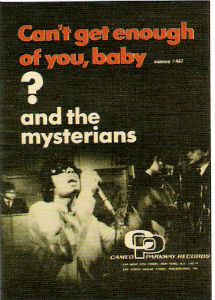 The third Cameo single
The third Cameo single
It was written by a couple of guys in New York after Cameo-Parkway had taken over. I wish the label would have waited, but they were in a rush to get something else out on the heels of “96 Tears”. Sometimes record companies have their heads up their asses because all they’re thinking is bottom line. I got into a discussion with Cameo and told them “Can’t Get Enough Of You Baby” should be the second single, but of course we had no power and that’s what happened with record companies back then.
MRRL: “Do Something To Me” was another great Mysterians’ single that failed to have much chart success, but then became a hit by Tommy James. What happened?
JL: I’ll put ? and The Mysterians’ version up against Tommy James’ any day. Let me tell you what I think happened with that, and it happened twice. I don’t want to speak ill of the dead, but I think I’ve told you that I’m not a big fan of Dick Clark. This is back in the day when I was also working for Billboard magazine and Dick had that Rate-A-Record thing on Bandstand. We knew that the momentum for ? and The Mysterians had started to fade a bit, so I sent him a demo recording of “Do Something To Me”. We sent that to him and then all of a sudden Tommy James comes out with his version. I had the same thing happen with the Cherry Slush record “Birthday”. We sent him a copy and then, within a month, he’s got a version of the song out by a group called the Underground Sunshine. I always wondered, I mean Dick Clark was Dick Clark is all I’ll say. He was a "real businessman".
Getting back to “Do Something To Me”, Cameo didn’t promote it. Who knows why? There are so many bad stories about the record industry back then. But they didn’t jump on it and then, all of a sudden not long afterward, Tommy James comes out with it. Cameo- Parkway wasn’t that big a company and had spread themselves thin. They were having money problems at the time and that might explain it.
Some of the groups from the 60’s and 70’s were really good bands but got in with the wrong people who could care less about the band and were only interested in the bottom line, to either launder money or who knows? The Cherry Slush was a prime example, but that’s the way it was. It was a crazy time.
MRRL: That brings me to my next question. One of the great Saginaw bands from that era was the Cherry Slush, a group you worked very closely with. What do you remember about their big hit, “I Cannot Stop You”, and working with the legendary Dick Wagner who wrote and produced it?
JL: I have some crazy memories of recording “I Cannot Stop You”. I remember we played the previous night at Daniel’s Den and then we packed up and drove all night to Cleveland. We recorded it at Cleveland Audio Sound, a studio that Dick Wagner was very familiar with. Dick wrote and produced the song and we had a kid named Don Sheets, who is now a veterinarian, come in and do the trumpet part. Mark Burdick, who was in the original Bells of Rhymny, played keyboards on the track but they fired him afterwards. The studio was in the basement of building in downtown Cleveland and we had to load everything on a freight elevator that goes down from the sidewalk. 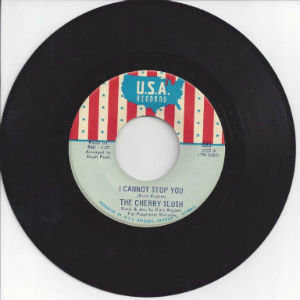 "I Cannot Stop You" 45
"I Cannot Stop You" 45
The funny part of the story was that we were so hungry on the drive to Cleveland that we stopped at a fast food place in Toledo called Johnny’s. It was a favorite stop for bands traveling from Detroit to Cleveland and was famous for its kielbasa. We each ate a meal of kielbasa and then six guys packed into a car with the windows rolled up and drove from Toledo to Cleveland. The gas in the gas tank wasn’t the only gas I had to worry about! Afterwards, we formed a publishing company called Kielbasa Music in honor of the trip.
“I Cannot Stop You” was a classic song, and you have to remember that the Cherry Slush were just 15 and 16-year-old kids. They pulled it off and they came close, but their next song, “Day Don’t Come”, should have been a big hit.
MRRL: If there was ever a great lost Michigan single, it would have to be “Day Don’t Come”.
JL: I wish I would have known you back then. I was looking for any help we could find to make that song a hit. Let me give you a couple of thoughts on that song. First of all, it was recorded at the Chess Studios in Chicago. The day before, in the same studio, the Rolling Stones were there. We had the Chicago Symphony strings moonlighting and playing on the track, and all the magazines – Billboard, Cash Box, and Record World – all predicted it would be a Top 5 smash.
I’ll always remember coming out of that recording session. I had the same feeling that I had when I first heard “96 Tears”. This could be the next gold record! Then it got buried. It’s too bad but USA Records was owned by the members of the underworld. The guys on the music end that we worked with, Bob Monaco and Bill Traut, also had the Cryan’ Shames, the American Breed, and the Shadows of Knight. It was so sad. “Day Don’t Come” basically got put on the shelf and was used to launder money. 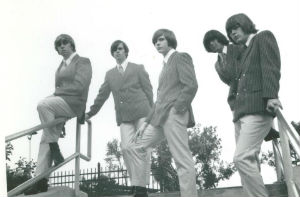 The Cherry Slush
The Cherry Slush
The USA guys were so ruthless that they said to me: “We don’t need those guys in the band. They’re too young for us. We have a band here in Chicago we want to call the Cherry Slush. You’ll stay the manager and the producer of their songs.” I said, ‘You want me to go back to Michigan and tell these five guys goodbye? I won’t do that.’ Those guys were just creeps. They didn’t care.
MRRL: Did your experience with USA have anything to do with your decision to start the Chivalry label?
JL: Oh yeah, it had a lot to do with it. I just said ‘I can’t deal with these people. I value whatever integrity I have and I’m not going to stoop to their level.’ At the time I was over at Buena Vista and was teaching Shakespeare, and I remember we were studying Beowulf which became the name of one of my publishing companies. It was also where the name Chivalry came from. The feeling was, and it’s still true 40 years later, ‘Chivalry is not dead’. The label is still very much alive, and if I saw the right band today I could put something out
MRRL: Was the first single on Chivalry “Birthday”/ “Feel A Whole Lot Better” by the Cherry Slush?
JL: Yes. “Feel A Whole Lot Better” was a Byrds’ song, but it was also the song that convinced me to get involved with the Cherry Slush. The bass player, Art Hauffe, was my sister’s son. She knew I worked with ? and The Mysterians and said, "Come on, this is family. Art is in a band and you should at least check them out." She ragged on me long enough that I said, ‘Nan just to get you off my back I’ll go over to Daniel’s Den on Saturday afternoon and watch their rehearsal.’ I walked in and heard them play “Feel A Whole Lot Better”. I knew then that I could do something with them. I took over management of the band with Vivian Bruce. She was the house mother and I took care of the business end of it. 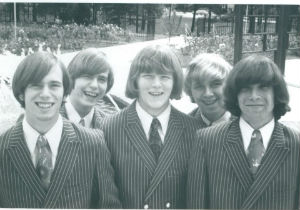 Brian Bennett, Gene Bruce, Dan Parsons, Art Hauffe, Dick Coughlin
Brian Bennett, Gene Bruce, Dan Parsons, Art Hauffe, Dick Coughlin
We went to the Great Lakes Recording Studio in Sparta, Michigan, to record the single. I produced it and Dave Kalmbach engineered the record. I’m very proud of that record and Charlie Woodward played on that one. Chris Hillman of the Byrds told me that the guitar solo that Gene Bruce did on the record was as good, if not better, than the one on the original Byrds’ recording. We slowed down the version on the CD with modern technology because we recorded the original too fast. It sounds as good today as it ever did.
“Birthday” was the first Cherry Slush record that Brian Bennett appeared on. He later became my partner in writing and publishing at BRIAN-JAMES Music. It was also recorded at Sparta, but at a later date. It was a fun little studio. The price was right, it was easy to get to, and Dave was a good guy who really worked with you. It had a really good sound to it, the acoustics were good, and it was just a comfortable place that still has some good memories.
MRRL: I don’t know very much about The Zoo, which has three songs on your CD. What can you tell me about them?
JL: The Zoo was composed of John Gilmour, Mike Jahncke, Rick Miller, Tom Jurgens, and Wolfgang Swartz. All the guys were from Bridgeport, which is where I grew up before moving to Saginaw. John’s dad and grandad delivered milk to my home back then. John and I used to ride on the school bus together and stayed in touch over the years. He put a band together and invited me to come and see them.
They were all very talented and very into music, especially Mike Jahncke. I produced and arranged a different version of the old Frankie Ford hit, “Sea Cruise”, as the band’s first Chivalry single. “Walking In A Country” was the second single and was a big local hit, reaching # 1 in Saginaw. The band had a very loyal following in the Saginaw Valley. The song was written by Jahncke, who also sang lead. I arranged it and it was recorded in Sparta. The backing vocals were done by the two sisters that John and Mike were dating and myself – the only song I ever sang on. 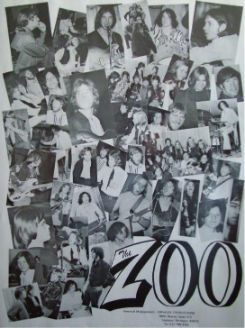 The Zoo poster
The Zoo poster
“444” has a great story. I was not feeling well. I had a case of the flu. We were playing Daniel’s Den and I drank a bottle of Vick’s 44 and I was higher than a kite from drinking that stuff. So down in the dressing room, I wrote the music and the words to “444” based on drinking Vick’s 44. The song sounded something like Led Zeppelin and it was so different from what this band did. They were not a heavy metal band so it was almost satire to a degree, and yet that song has been played all over and became kind of a bootleg hit over in Europe.
MRRL: Was this recorded at Daniel’s Den?
JL: I’m going to call this, because I don’t know of any other, the only live 45 to ever come out of Daniel’s Den. Eddie Kurth recorded it. Who knows what he used? I think it was a 4-track machine and he had the mikes. I remember Frank Patrick, the owner, asking "What are you guys doing?’"I said, ‘We’re going to record a couple of things that we might put on a 45.' When he heard the band doing “444” all he said was, "That’s not the Zoo; that’s just not the Zoo."
MRRL: Was the group Saginaw connected to these guys?
JL: This group formed after the Zoo broke up. John Gilmour, Mike Jahncke, and another kid from Bridgeport called Ben List recorded “Prayer”. Do you remember the Ginger Blue coffee house on Hamilton in Saginaw? This was basically a folk group that played the kind of music that John and Mike loved. We named them Saginaw and they did a lot of original stuff that was mostly written by Mike. “Prayer” really caught on, so we went out and got a cello, a muted trumpet, a piano, and a Russian string instrument called a balalaika for the recording. As I said earlier, I’ve got a lot of response for the song from people who’ve bought the CD.
MRRL: Magic has two songs on your CD. Where was this band from and how did you become involved with them?
JL: Magic started off as basically a bar band. They played Hidden Hollow and all of the bars in the circuit including the Sabre Room at Bay Lanes in Bay City where we were basically the house band for a while. They were a good band, so one day Brian Bennett and I thought we should come up with some original songs the band could record for the Chivalry label. I wrote the words and Brian wrote the music for “May We Both Get What We Want” and “If You Can’t Be Good” and we recorded them. I listened to the two songs today and there is a lot of my life in those songs. I was going through a divorce at the time and it’s kind of weird hearing your life of nearly 40 years ago played back to you.
I played the cowbell on “If You Can’t Be Good” – the only time I ever played an instrument on a recording. We also did something that was revolutionary. After I hit the cowbell, we reversed the tape and then the cowbell was played in reverse. You can hear it if you listen for it on the song.
The band was from Saginaw. Chris Lynar was in the band. His dad, Don Andrews, was a big DJ in Saginaw. He played guitar sang the lead on “If You Can’t Be Good”. He may have passed away, but I’m not sure. The band was kind of jinxed. We had two bass players that died. I think they were both from Bay City: Bill Burton and Tom Seacrest.
Robert Martinez, Question Mark’s brother and the original drummer for the Mysterians, sang lead on “May We both Get What We Want”. Robert was the drummer in Magic.
MRRL: I remember seeing the John Brown Band on several occasions at the old Fordney Hotel in Saginaw. How did you get involved with them?
JL: They were from Grand Rapids. I’ll never forget John Brown. He had bought an old one-room school house and he made it into his home. He bought a Corvette Stingray, the one with the sloped back, and he had the Corvette in his living room on blocks. He never drove the car! I think John is still alive but I haven’t talked to him in years. 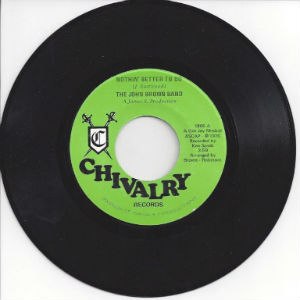 The John Brown Band 45
The John Brown Band 45
I’m really proud of that song, “Nothing Better To Do”. I’ll tell you why. I walked into the Fordney one day and he told me, "I’ve got this song but we haven’t got it finished yet. There’s a guy in Grand Rapids who wrote most of the music but we need the words”. It was a rehearsal, and they played the music and I really liked it a lot. So they said, "Come on, let’s write the words." So I wrote most of the words, but I failed to put my name on the writing credits on the original release.
We went down to United Sound in Detroit to record it. That’s where the early Motown stuff was recorded. I had a Corvette at the time and sold it and invested part of the money into the recording of that song. I produced the record and we had Rudy Robinson on keyboards. He was next door recording with Johnnie Taylor, and he came in and we talked him into doing the synthesized strings on our record. Then Bob Babbitt of the Funk Brothers stopped by and laid down a bass track. It ended up not doing that well, but it was a great track during the disco era and it’s one of my favorites. It was the last Chivalry single.
MRRL: We’ve covered all the songs, is there anything else you’d like people to know about the CD?
JL: Well, the guy who does the 13-second intro on the CD is Mike Blakeney. He’s out of Louisiana, and he does voice-overs for commercials all over the country. He’s got what I call ‘the voice of God’, and it’s one that has been heard just about everywhere.
I’m very proud of this thing, and it’s a chance for younger people to hear what was going on in the Saginaw area back in the day. I think we should all be proud of that music. There were a lot of talented musicians and a lot of good things happening.
***“Jimmy Hollywood’s Greatest Hits” can be ordered at amazon.com, or it can be downloaded from iTunes and other sites.

